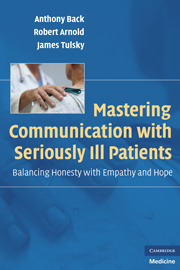Book contents
- Frontmatter
- Contents
- PREFACE
- 1 TAKING YOUR SKILLS TO THE NEXT LEVEL
- 2 GETTING A GOOD START
- 3 TALKING ABOUT SERIOUS NEWS
- 4 DISCUSSING EVIDENCE FOR MAKING TREATMENT DECISIONS
- 5 DISCUSSING PROGNOSIS
- 6 BETWEEN THE BIG EVENTS
- 7 CONDUCTING A FAMILY CONFERENCE
- 8 DEALING WITH CONFLICTS
- 9 TRANSITIONS TO END-OF-LIFE CARE
- 10 TALKING ABOUT DYING
- 11 CULTIVATING YOUR SKILLS
- APPENDIX A THE ROADMAPS IN OUTLINE FORM
- APPENDIX B ACKNOWLEDGMENTS
- INDEX
5 - DISCUSSING PROGNOSIS
Damned if you do, damned if you don't
Published online by Cambridge University Press: 23 November 2009
- Frontmatter
- Contents
- PREFACE
- 1 TAKING YOUR SKILLS TO THE NEXT LEVEL
- 2 GETTING A GOOD START
- 3 TALKING ABOUT SERIOUS NEWS
- 4 DISCUSSING EVIDENCE FOR MAKING TREATMENT DECISIONS
- 5 DISCUSSING PROGNOSIS
- 6 BETWEEN THE BIG EVENTS
- 7 CONDUCTING A FAMILY CONFERENCE
- 8 DEALING WITH CONFLICTS
- 9 TRANSITIONS TO END-OF-LIFE CARE
- 10 TALKING ABOUT DYING
- 11 CULTIVATING YOUR SKILLS
- APPENDIX A THE ROADMAPS IN OUTLINE FORM
- APPENDIX B ACKNOWLEDGMENTS
- INDEX
Summary
When discussing prognosis, physicians face a series of contradictory impulses. For many, telling patients that their illness will take their life makes doctors feel like they are giving out a “death sentence.” The prognosis conversation is difficult, and often times it's easier to let these issues slip into the background and focus instead on symptoms, logistics, or hoping the patient will respond to treatment. Yet, these same physicians also know that when patients don't realize how close to death they really are, they often fail to make plans, including sharing preferences for the medical care they want at the end of life. When this occurs, families and clinicians are left making decisions for them - often with conflict and heartache. Thus, for many physicians, the impulse to inform the patient and the impulse to avoid a discouraging discussion coexist.
Patients have their own contradictory impulses. On one hand, in surveys, patients consistently say that they want a great deal of prognostic information. For example, in one British study, 87% of patients wanted “all possible information.” On the other hand, patients also warn clinicians about being “too blunt,” and say that “supporting hope” is very important. To further complicate matters, a significant minority of patients wants to avoid prognostic information altogether, and in some cultures, to speak about a bad prognosis creates a self-fulfilling prophecy. How can a doctor possibly get this right?
- Type
- Chapter
- Information
- Mastering Communication with Seriously Ill PatientsBalancing Honesty with Empathy and Hope, pp. 49 - 66Publisher: Cambridge University PressPrint publication year: 2009



